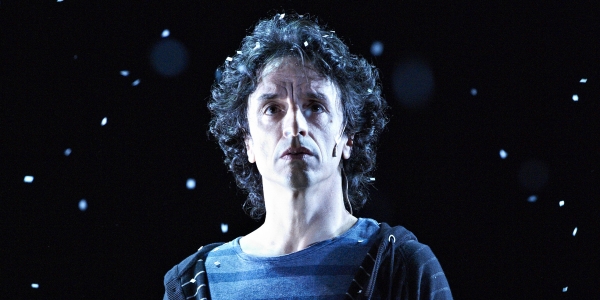But in Matthew Lutton’s Die Winterreise (The Winter Journey), a contemporary reworking of Franz Schubert’s 24-part song cycle, Capsis, along with two other performers, will be taking on the role of Schubert’s lonely wanderer. Here, this protagonist in search of his past has been re-imagined in three incarnations: actor George Shevstov plays him in the present, while dancer James O’Hara and singer Capsis play visions of his former self come back to haunt him.
Die Winterreise will begin at the Malthouse’s Merlyn Theatre on July 20, after premiering at the State Theatre Centre in Perth this April. When I speak with Capsis, he’s taking a break from the rehearsal room where the team have spent the last week reacquainting themselves with the work. “I’ve been singing Schubert all morning. It’s been frantic! Frantic Franz!” he laughs.
Having never trained as a classical singer, Capsis has found the composition’s vocal style a test. But perhaps the biggest hurdle for all involved has been fine-tuning the multidisciplinary aspect of the show, in which three disparate performers must somehow cohere into one character. “It’s a big work,” says Capsis. “It’s difficult music. [But] I guess that’s a good thing. You learn a lot from being challenged”.
Written in 1827, Die Winterreise was conceived as a setting for 24 poems by Wilhelm Müeller. They tell the tale of a lovelorn poet who, after his beloved deserts him for another man, embarks upon a journey into the iciest of winters. In true Romantic style, the landscape he encounters reflects his interiority, the frozen rivers and barren trees as frostbitten as his broken heart. Created during what was thought to be a time of deep depression for Schubert, it is perhaps the truth of its sentiment that has made this song cycle so enduring.
Considering the difficulty of Schubert’s masterpiece, staging Die Winterreise would be a once in a lifetime project for most. But not for Capsis. He performed it in Barrie Kosky’s eight-hour epic, The Lost Echo, at Sydney Theatre Company in 2006, the last two hours of which featured the 24-part song cycle in its entirety. In both these productions, it has been the haunting nature of Schubert’s composition that has drawn Capsis to the work.
“There’s something that I, as a performer, as an artist, identify with [in] this piece of music. I remember when I was performing it with Kosky it would haunt me, and it’s done the same thing this time around… You dream it. You wake up with it. You go to sleep with it. It really does affect you,” he says. “[But] what I enjoy about this production is that we… really take it out there. It’s very modern”.
Director Matthew Lutton has been hyped as something of a wunderkind in the world of Australian theatre, since starting his Perth-based company ThinIce at the tender age of 17. This will be Lutton’s first play after relocating to Melbourne in May to become the Malthouse’s Artistic Associate under the new direction of Marion Potts. Lutton’s production of The Trial, adapted from Kafka’s canonical novel, was also staged at the Malthouse last year to rave reviews.
Lutton’s vision, however, may be controversial for Schubert purists. A song cycle is, by definition, intended for all parts to be played in succession. Lutton has instead chopped and changed the original in what is fast-becoming his characteristic style. Capsis will sing in English rather than German, and will perform only 14 parts, some of which have been rearranged or even reconfigured. The piece will also be accompanied by a new monologue by playwright Tom Holloway. Moreover, the setting will move from the snow-capped peaks of Schubert’s native Austria to a milieu Malthouse patrons may be more familiar with: a suburban home in the height of an Australian summer.
Despite these revisions, Capsis says the central concerns of the work remain very relevant to a contemporary audience. He relates its themes of isolation and loneliness to states engendered by internet culture and mobile technologies. “I’m of an age that I can remember before mobile, before iPad,” says Capsis. “I personally feel very isolated, incredibly disconnected and it’s an awful feeling. Sometimes I have to turn off my computer, go outside… [and] reconnect humanity to life”.
But on the flipside, Capsis suggests that the theatre may also provide an antidote to the very isolation this work is exploring. “When you see a painting or a piece of theatre or a piece of music, you may be down. But perhaps that work affirms where you are. Perhaps it makes you think, ‘Yeah, this is what happens to us as humans… We can hit rock bottom. Or we can be ecstatically happy’. That’s what I look for when I see a piece of art. That’s what determines whether I’m connected to it or not… And I feel a very deep connection with this work”.







